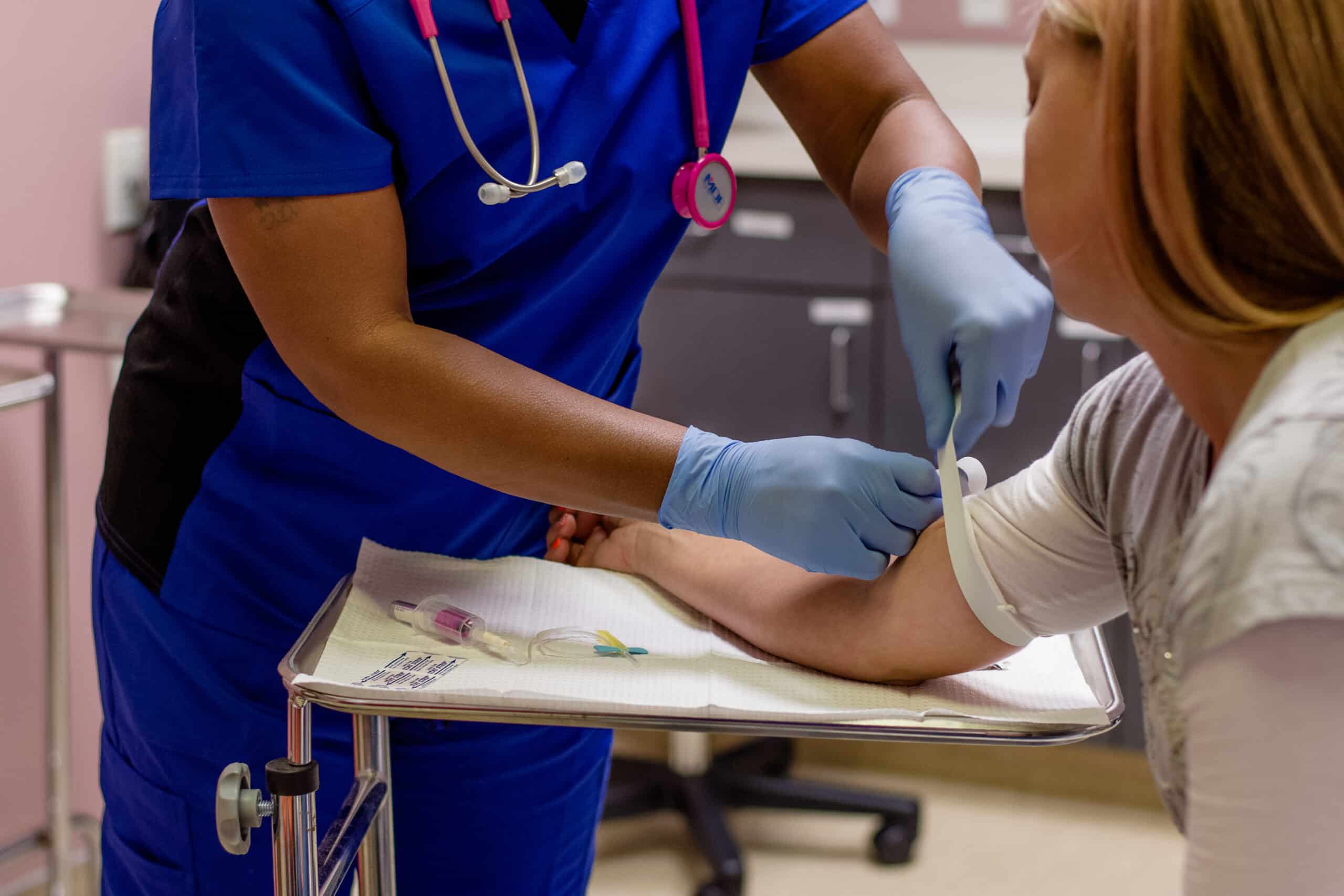The Course to Certification: Recognizing the Phlebotomy Training Program Trip and Its Relevance
As you consider the path to certification in phlebotomy, it's essential to understand the role you'll play in healthcare. Your training will cover important skills, from blood collection techniques to patient communication.

The Role of Phlebotomists in Medical Care
Phlebotomists play a necessary role in the medical care system, serving as the vital link in between clients and essential diagnostic screening. You'll carry out blood attracts, guaranteeing examples are collected properly and safely. Your expertise assists in detecting medical problems, keeping track of wellness, and directing therapy decisions.
In your everyday communications, you'll need to establish trust fund with patients, making them feel comfy throughout what may be a difficult experience. You're liable for labeling and managing examples carefully to stop contamination or mistakes, which can influence test results.
Past this, you'll often work alongside medical professionals and registered nurses, connecting essential details regarding individuals' conditions. By mastering your abilities, you add meaningfully to client care, making you an essential component of the clinical team.
Overview of Phlebotomy Training Programs
When discovering phlebotomy training programs, you'll locate various types created to fit different routines and learning designs. Each program assists you establish important skills like blood collection and person interaction. Understanding these alternatives is crucial to choosing the appropriate path for your career.
Kinds of Training Programs
A number of kinds of training programs are readily available for those looking to become skilled in phlebotomy. In addition, some hospitals and clinics provide on-the-job training programs, offering functional experience while you discover. Whatever course you pick, each program intends to equip you with the required skills for a successful phlebotomy profession.

Secret Skills Created
Grasping phlebotomy requires a collection of crucial skills that are created with thorough training programs. You'll find out technical abilities like appropriate vein choice, needle insertion, and blood collection techniques. These hands-on techniques guarantee you can execute procedures securely and effectively. In addition, communication abilities are fundamental; you'll require to interact with individuals, discuss treatments, and put them secure. Understanding composition and physiology is crucial, as well, as it helps you find blood vessels and understand the body's action to blood draws. You'll get expertise of safety procedures and infection control, ensuring you keep a sterile atmosphere. Each of these abilities is crucial for your success as a certified phlebotomist, making you a useful property in any kind of healthcare setting.
Secret Components of a Phlebotomy Course
In a phlebotomy course, you'll concentrate on essential subjects that prepared for your future job. You'll involve in hands-on training that enables you to apply what you've found out in real-world setups. Both the core curriculum and useful experience are vital for your success as a phlebotomist.
Core Curriculum Overview
While seeking a phlebotomy training program, you'll come across a curriculum designed to outfit you with essential skills and expertise. Phlebotomy Courses Near Me. This educational program usually includes makeup and physiology, concentrating on the blood circulation system and recognizing blood components. You'll additionally find out about various kinds of blood collection approaches, including venipuncture and capillary slit methods
Additionally, infection control and security protocols are crucial elements, guaranteeing you know just how to maintain a clean and sterile environment. You'll research patient interaction, highlighting interaction and empathy, which are essential for relieving person stress and anxiety. Ethical and lawful factors to consider will be dealt with, preparing you for real-world duties. This foundational understanding will certainly allow you to excel as a phlebotomist and supply top quality care in medical setups.
Hands-On Training Experience
Getting hands-on experience is a vital part of your phlebotomy training course. This sensible training permits you to apply what you've found out in a real-world setup, improving your skills and self-confidence. Phlebotomy Courses Near Me.
Furthermore, you'll get the opportunity to engage with clients, which is important for creating your interaction skills. This mix of technical effectiveness and interpersonal skills is important for your success as a licensed phlebotomist. Ultimately, hands-on training is where concept meets technique, solidifying your expertise and readiness for qualification.
Accreditation and Licensing Needs
Before you can begin your profession in phlebotomy, it is essential to comprehend the qualification and licensing demands that differ by state. Many states need phlebotomists to hold an accreditation from an identified company, such as the National Phlebotomy Association or the American Culture for Clinical Pathology. These accreditations typically include passing a test that evaluates your expertise and abilities in the field.
In enhancement to qualification, some states have specific licensing demands. You might require to complete a specific variety of hours in professional practice, submit evidence of training, or undertake a history check. It is essential to research your state's guidelines to ensure you meet all required requirements.
Remaining educated concerning these requirements not only assists you protect a setting yet additionally boosts your reliability as an expert. By satisfying these demands, you'll be well on your means to an effective job in phlebotomy.
Hands-On Training and Practical Experience
Hands-on training and sensible experience are essential components of your phlebotomy education, as they allow you to apply academic expertise in real-world scenarios. Throughout your training, you'll involve in monitored venipuncture, discover appropriate methods, and end up being knowledgeable about various blood collection equipment. This direct participation is essential for constructing your self-confidence and sharpening your abilities.
You'll work closely with experienced specialists that can assist you with the nuances of patient communication and example handling. Each method session not only reinforces your understanding yet likewise prepares you for the hectic environment of medical care setups.
Additionally, many programs include scientific rotations, permitting you to experience diverse settings, from hospitals to outpatient facilities. This exposure helps you adjust to different obstacles and client needs, guaranteeing you're well-prepared for your future function. Embrace these chances, as they're necessary to becoming a skilled and thoughtful phlebotomist.
Difficulties Encountered During Training
While gaining hands-on experience is necessary, it is very important to identify the challenges that can emerge during your phlebotomy training. You may encounter stress and anxiety when performing procedures on actual patients, particularly if you're brand-new to the environment. The stress to obtain everything right can be frustrating. In addition, mastering the skills needed for blood attracts takes practice; you may deal with strategy initially.
Time management can also be an obstacle, as balancing theory, functional sessions, and individual dedications can really feel daunting. You might encounter differing finding out rates amongst your peers, bring about sensations of insecurity if you assume you're dropping behind. Adapting to the different personalities of teachers can be tough, as each might have a special mentor style.
Recognizing these obstacles early on can prepare you for success and aid you create durability throughout your training trip.
Job Opportunities After Qualification

As you gain experience, you may also take into consideration specializing in areas like pediatric or senior citizen phlebotomy, providing to details patient requirements. Some phlebotomists select to progress their jobs by becoming laboratory service technicians or going after more education and learning in medical care fields.
Additionally, your certification can result in functions in training or overseeing brand-new phlebotomists, permitting you to share your expertise. With the medical care sector consistently expanding, your abilities will certainly constantly remain in demand, leading the way for a stable and fulfilling profession. Embrace the opportunities waiting for you!
Frequently Asked Inquiries
What Is the Regular Period of a Phlebotomy Educating Program?
Phlebotomy training courses generally last Phlebotomy Classes Near Me around four to 8 weeks. You'll involve in hands-on method, classroom instruction, and online learning. Finishing this training prepares you for accreditation and a gratifying profession in healthcare.
Are Online Phlebotomy Courses Available?
Yes, on-line phlebotomy training courses are offered. They provide flexibility and ease, enabling you to study at your very own speed. Just validate the program is recognized to meet qualification demands and gain beneficial skills for your career.
Just How Much Does Phlebotomy Training Usually Cost?
Phlebotomy training commonly costs in between $700 and $2,500, depending upon the program and location. You must consider variables like program size, included products, and hands-on experience when choosing the ideal training for you.
What Are Common Prerequisites for Phlebotomy Training?
Typical requirements for phlebotomy training often include a senior high school diploma or GED, booster shots, and a history check. Some programs may also need fundamental medical care expertise or certifications, ensuring you're gotten ready for hands-on training.
Can I Work While Finishing My Phlebotomy Training?
Yes, you can function while finishing your phlebotomy training. Several pupils equilibrium jobs with their studies, but make specific to manage your time efficiently to ensure you satisfy both work and training commitments effectively.
Comments on “Phlebotomy Courses Near Me: Step-by-Step Application Process”